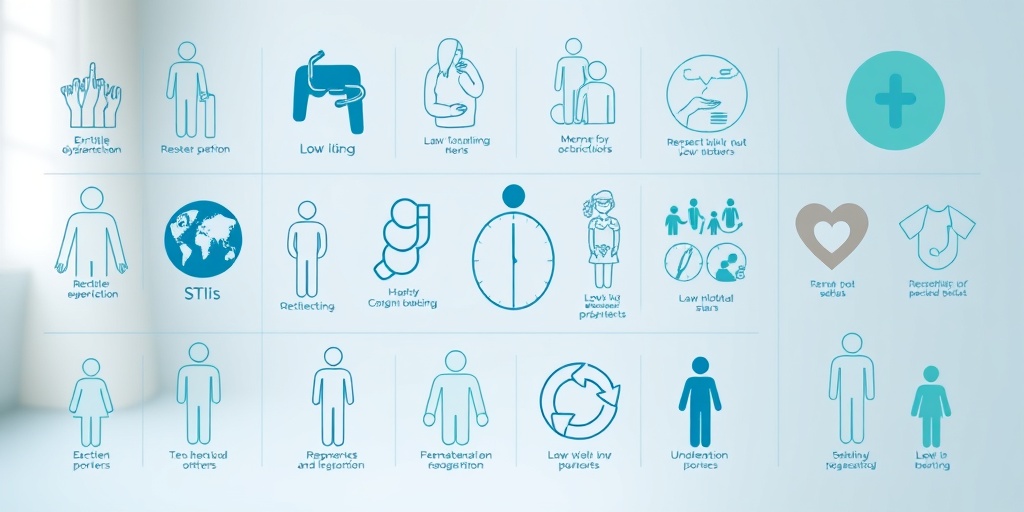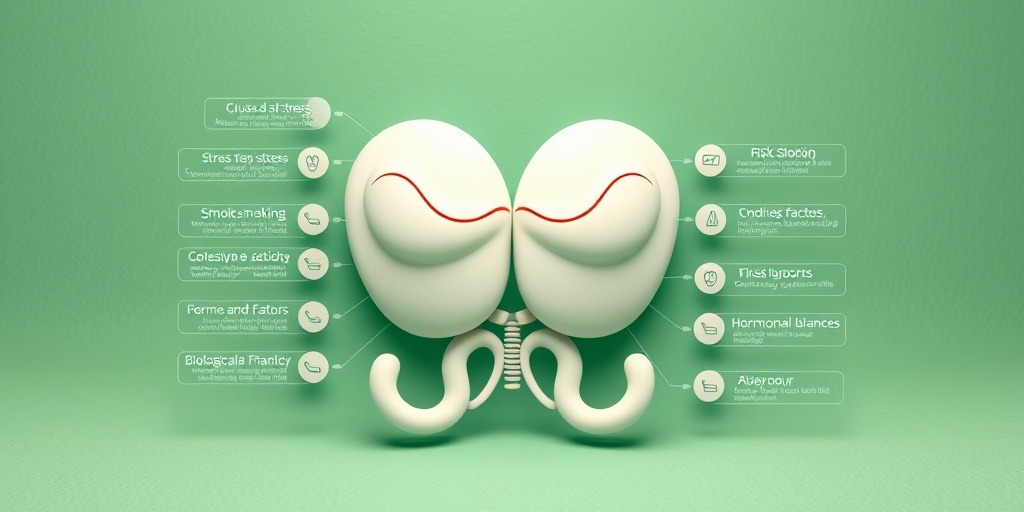What Are Sexual Conditions?
Sexual conditions refer to a wide range of health issues that can affect an individual’s sexual health and overall well-being. These conditions can impact both men and women, influencing their sexual function, desire, and satisfaction. Understanding sexual conditions is crucial for maintaining a healthy sexual life and addressing any concerns that may arise.
Sexual conditions can be classified into various categories, including physical, psychological, and emotional factors. They can stem from medical issues, hormonal imbalances, psychological disorders, or even relationship problems. It’s essential to recognize that experiencing a sexual condition is not uncommon, and seeking help is a vital step towards recovery and improved sexual health.
Types of Sexual Conditions
Sexual conditions can manifest in numerous ways, and their effects can vary significantly from person to person. Some common types include:
- Sexual Dysfunction: This includes issues such as erectile dysfunction in men and low libido in women.
- Sexually Transmitted Infections (STIs): Infections like chlamydia, gonorrhea, and HIV can significantly impact sexual health.
- Hormonal Disorders: Conditions like polycystic ovary syndrome (PCOS) can affect sexual desire and function.
- Painful Intercourse: Conditions such as vaginismus or vulvodynia can cause discomfort during sexual activity.
Recognizing these conditions early can lead to better management and treatment options. If you suspect you may be experiencing a sexual condition, consulting a healthcare professional is essential for proper diagnosis and care.
Common Sexual Conditions
Many individuals experience sexual conditions at some point in their lives. Here are some of the most common sexual conditions that people may encounter:
Erectile Dysfunction (ED)
Erectile dysfunction is a prevalent condition among men, characterized by the inability to achieve or maintain an erection sufficient for sexual intercourse. Factors contributing to ED can include:
- Physical Health Issues: Conditions like diabetes, heart disease, and obesity can lead to ED.
- Psychological Factors: Stress, anxiety, and depression can also play a significant role.
Fortunately, various treatment options are available, ranging from lifestyle changes to medications. Seeking help from a healthcare provider can lead to effective solutions.
Low Libido
Low libido, or reduced sexual desire, can affect both men and women. Several factors can contribute to this condition, including:
- Hormonal Imbalances: Changes in hormone levels, particularly testosterone in men and estrogen in women, can impact libido.
- Emotional Factors: Stress, relationship issues, and mental health conditions can also diminish sexual desire.
Addressing the underlying causes through therapy, lifestyle changes, or medical intervention can help restore sexual desire.
Sexually Transmitted Infections (STIs)
STIs are infections transmitted through sexual contact and can have serious implications for sexual health. Common STIs include:
- Chlamydia: Often asymptomatic, but can lead to serious reproductive health issues if left untreated.
- Gonorrhea: Similar to chlamydia, it can cause complications in both men and women.
- HIV: A chronic condition that requires ongoing management but can be controlled with proper treatment.
Regular screenings and practicing safe sex are crucial for preventing STIs and maintaining sexual health.
Painful Intercourse
Painful intercourse, or dyspareunia, can affect individuals of all genders. Conditions that may cause this discomfort include:
- Vaginismus: Involuntary muscle contractions that make penetration painful or impossible.
- Vulvodynia: Chronic pain in the vulvar area that can lead to discomfort during sexual activity.
Consulting a healthcare provider can help identify the cause and provide appropriate treatment options.
In conclusion, understanding sexual conditions is vital for maintaining a healthy sexual life. If you or someone you know is experiencing any of these issues, don’t hesitate to reach out for help. Resources like Yesil Health AI can provide evidence-based answers and support for navigating sexual health concerns. Remember, seeking help is a sign of strength, and you deserve to enjoy a fulfilling sexual life! 🌟

Symptoms of Sexual Conditions
Understanding the symptoms of sexual conditions is crucial for early detection and effective treatment. These symptoms can vary widely depending on the specific condition, but there are some common signs that individuals should be aware of. Recognizing these symptoms can lead to timely medical intervention and improved sexual health.
Common Symptoms
- Pain during intercourse: This can be a significant indicator of various sexual conditions, affecting both men and women.
- Changes in libido: A noticeable increase or decrease in sexual desire can signal underlying issues.
- Unusual discharge: For women, abnormal vaginal discharge can indicate infections or other conditions.
- Erectile dysfunction: In men, difficulty achieving or maintaining an erection can be a sign of sexual health problems.
- Itching or irritation: This can occur in the genital area and may be associated with infections or allergies.
- Bleeding: Unexplained bleeding during or after sexual activity should be evaluated by a healthcare professional.
It’s important to note that experiencing one or more of these symptoms does not necessarily mean you have a serious sexual condition. However, if these symptoms persist, it’s advisable to consult a healthcare provider for a thorough evaluation. Early diagnosis can lead to more effective treatment options and better outcomes.
Emotional and Psychological Symptoms
In addition to physical symptoms, sexual conditions can also manifest through emotional and psychological symptoms. These may include:
- Anxiety or depression: Concerns about sexual performance or health can lead to significant emotional distress.
- Relationship issues: Sexual conditions can strain relationships, leading to communication problems and decreased intimacy.
- Low self-esteem: Individuals may feel less confident about their bodies or sexual abilities.
Addressing these emotional aspects is just as important as treating the physical symptoms. Seeking support from mental health professionals or sexual health counselors can be beneficial in navigating these challenges.
Causes and Risk Factors
Understanding the causes and risk factors associated with sexual conditions is essential for prevention and management. These factors can be biological, psychological, or environmental, and they often interact in complex ways.
Biological Causes
Many sexual conditions stem from biological factors, including:
- Hormonal imbalances: Changes in hormone levels, particularly in women during menopause or pregnancy, can affect sexual health.
- Medical conditions: Chronic illnesses such as diabetes, heart disease, and neurological disorders can impact sexual function.
- Infections: Sexually transmitted infections (STIs) can lead to various sexual health issues if left untreated.
Psychological Factors
Psychological factors also play a significant role in sexual conditions. These may include:
- Stress and anxiety: High levels of stress can lead to decreased libido and sexual dysfunction.
- Past trauma: Experiences of sexual assault or abuse can result in long-term psychological effects that impact sexual health.
- Body image issues: Negative perceptions of one’s body can lead to avoidance of sexual activity.
Environmental and Lifestyle Factors
Environmental and lifestyle choices can also contribute to sexual conditions. Consider the following:
- Substance abuse: Alcohol and drug use can impair sexual function and lead to risky sexual behaviors.
- Lack of communication: Poor communication with partners can exacerbate sexual issues and lead to misunderstandings.
- Sedentary lifestyle: Lack of physical activity can affect overall health, including sexual health.
By understanding these causes and risk factors, individuals can take proactive steps to improve their sexual health and seek appropriate treatment when necessary. Awareness and education are key components in managing sexual conditions effectively. 🌟

Diagnosis of Sexual Conditions
Diagnosing sexual conditions can be a complex process, as it often involves a combination of physical examinations, medical history assessments, and psychological evaluations. Understanding the symptoms and seeking timely medical advice is crucial for effective treatment and management.
Understanding Symptoms
Symptoms of sexual conditions can vary widely depending on the specific issue at hand. Common symptoms may include:
- Pain during intercourse
- Changes in libido
- Difficulty achieving or maintaining an erection
- Unusual discharge or bleeding
- Emotional distress or anxiety related to sexual activity
If you experience any of these symptoms, it’s essential to consult a healthcare professional. They can help determine whether your symptoms are related to a sexual health condition or another underlying issue.
Medical History and Physical Examination
During your visit, the healthcare provider will likely take a detailed medical history, which may include:
- Your sexual history, including any previous conditions or treatments
- Any medications you are currently taking
- Family history of sexual or reproductive health issues
A physical examination may also be conducted to assess any physical signs of a sexual medical condition. This could involve a pelvic exam for women or a genital examination for men. In some cases, additional tests such as blood tests, urine tests, or imaging studies may be necessary to reach a diagnosis.
Psychological Evaluation
Many sexual conditions have psychological components. Conditions such as sexual dysfunction can be influenced by stress, anxiety, or past trauma. A mental health evaluation may be recommended to address these factors. This could involve:
- Questionnaires about your emotional well-being
- Discussions about any past experiences that may affect your sexual health
By understanding both the physical and psychological aspects of your condition, healthcare providers can offer a more comprehensive treatment plan.
Treatment Options
Once a diagnosis is made, various treatment options are available for managing sexual conditions. The appropriate treatment will depend on the specific condition, its severity, and individual patient needs.
Medications
For many sexual health conditions, medications can be an effective treatment option. Common medications include:
- Hormonal therapies for conditions related to hormonal imbalances
- Antidepressants or anxiolytics for psychological factors affecting sexual function
- Phosphodiesterase type 5 inhibitors (like Viagra) for erectile dysfunction
It’s important to discuss potential side effects and interactions with your healthcare provider before starting any medication.
Therapy and Counseling
For conditions with psychological components, therapy can be incredibly beneficial. Options include:
- Individual therapy to address personal issues affecting sexual health
- Couples therapy to improve communication and intimacy between partners
- Sex therapy to explore sexual concerns in a safe environment
Therapists can provide strategies to cope with anxiety, improve communication, and enhance sexual experiences.
Physical Treatments
In some cases, physical treatments may be necessary. These can include:
- Pelvic floor therapy for women experiencing pain during intercourse
- Vacuum erection devices for men with erectile dysfunction
- Surgery for anatomical issues affecting sexual function
These treatments can help restore function and improve quality of life.
Lifestyle Changes
Incorporating healthy lifestyle changes can also play a significant role in managing sexual conditions. Consider:
- Regular exercise to improve blood flow and reduce stress
- A balanced diet to support overall health
- Avoiding smoking and excessive alcohol consumption
Making these changes can enhance your overall well-being and positively impact your sexual health. 🌱
Remember, addressing sexual conditions is a vital part of overall health. Seeking help and exploring treatment options can lead to improved sexual function and a better quality of life. 💖

Home Remedies and Lifestyle Changes
When it comes to managing sexual conditions, many individuals seek natural remedies and lifestyle adjustments that can enhance their sexual health. These approaches not only promote overall well-being but can also alleviate symptoms associated with various sexual health issues. Here are some effective home remedies and lifestyle changes to consider:
1. Diet and Nutrition
Your diet plays a crucial role in your sexual health. Incorporating certain foods can boost libido and improve sexual function. Consider adding the following to your meals:
- Fruits and Vegetables: Foods rich in antioxidants, such as berries, spinach, and tomatoes, can improve blood circulation and enhance sexual performance.
- Nuts and Seeds: Almonds, walnuts, and pumpkin seeds are packed with essential fatty acids and vitamins that support hormone production.
- Dark Chocolate: This delicious treat contains flavonoids that can improve blood flow and increase arousal.
2. Regular Exercise
Engaging in regular physical activity is vital for maintaining a healthy body and mind. Exercise can help:
- Boost your mood by releasing endorphins.
- Improve blood circulation, which is essential for sexual arousal.
- Enhance stamina and flexibility, making sexual activity more enjoyable.
Consider activities like yoga, swimming, or even brisk walking to keep your body active and your sexual health in check. 🏋️♂️
3. Stress Management
High levels of stress can significantly impact your sexual health. Finding effective ways to manage stress is crucial. Here are some techniques:
- Meditation: Practicing mindfulness can help calm your mind and improve your overall well-being.
- Deep Breathing Exercises: These can reduce anxiety and enhance relaxation, making it easier to engage in intimate moments.
- Quality Sleep: Ensure you get enough restful sleep, as fatigue can negatively affect your libido.
4. Herbal Remedies
Several herbs are known for their potential benefits in enhancing sexual health. Some popular options include:
- Ginseng: Often used to boost energy and libido.
- Maca Root: This Peruvian root is believed to enhance sexual desire and improve fertility.
- Tribulus Terrestris: Known for its potential to increase testosterone levels and improve sexual function.
Always consult with a healthcare professional before starting any herbal supplements to ensure they are safe for you. 🌿
Preventing Sexual Conditions
Prevention is key when it comes to maintaining sexual health and avoiding sexual conditions. Here are some effective strategies to help you stay healthy:
1. Regular Health Check-ups
Routine check-ups with your healthcare provider can help identify potential issues before they become serious. Regular screenings for sexually transmitted infections (STIs) and other sexual health conditions are essential, especially if you have multiple partners or engage in high-risk sexual behavior. 🩺
2. Safe Sex Practices
Practicing safe sex is one of the most effective ways to prevent sexual health conditions. Here are some tips:
- Use Condoms: They are effective in reducing the risk of STIs and unintended pregnancies.
- Limit Number of Partners: Reducing the number of sexual partners can lower your risk of exposure to infections.
- Communicate: Open discussions with your partner about sexual history and health can help ensure both parties are informed and safe.
3. Vaccinations
Vaccines can protect against certain sexually transmitted infections. For example, the HPV vaccine can significantly reduce the risk of cervical cancer and genital warts. Speak with your healthcare provider about which vaccinations are appropriate for you. 💉
4. Educate Yourself
Knowledge is power when it comes to sexual health. Understanding the risks associated with various sexual behaviors and being aware of the signs and symptoms of sexual conditions can empower you to make informed decisions. Consider reading reputable sources or attending workshops on sexual health.
By incorporating these home remedies and lifestyle changes, along with preventive measures, you can take significant steps toward maintaining your sexual health and well-being. Remember, your sexual health is an essential aspect of your overall health, and taking proactive measures can lead to a more fulfilling life. 🌟

Frequently Asked Questions about Sexual Conditions
What are common sexual conditions in women?
Women may experience a variety of sexual conditions that can affect their sexual health. Some common conditions include:
- Vaginismus: Involuntary muscle contractions that make penetration painful or impossible.
- Dyspareunia: Pain during intercourse that can stem from various physical or psychological factors.
- Low libido: A decrease in sexual desire that can be influenced by hormonal changes, stress, or relationship issues.
What are some sexual health conditions that affect men?
Men can also face several sexual health conditions, including:
- Erectile dysfunction: Difficulty achieving or maintaining an erection.
- Peyronie’s disease: Development of fibrous scar tissue inside the penis, causing curved, painful erections.
- Low testosterone: A condition that can lead to reduced sexual desire and other health issues.
Are there rare sexual conditions I should be aware of?
Yes, there are rare sexual conditions that may not be widely known but can significantly impact individuals. Some examples include:
- Hypersexuality: An overwhelming desire for sexual activity that can disrupt daily life.
- Sexual aversion disorder: An intense fear or aversion to sexual contact.
What constitutes high-risk sexual behavior?
High-risk sexual behavior refers to practices that increase the likelihood of sexually transmitted infections (STIs) or unintended pregnancies. Examples include:
- Having unprotected sex with multiple partners.
- Engaging in sexual activity while under the influence of drugs or alcohol.
- Not getting regular STI screenings.
How can I address sexually inappropriate behavior?
Understanding what constitutes sexually inappropriate behavior is crucial for maintaining healthy relationships. This behavior can include:
- Unwanted touching or advances.
- Making sexual comments that are unwelcome.
- Coercing someone into sexual activity.
If you or someone you know is experiencing such behavior, it is important to seek help from a professional or a support group. 💬
What are the bail conditions for sexual offences?
Bail conditions for sexual offences can vary depending on the jurisdiction but often include:
- Restrictions on contact with the victim.
- Prohibition from accessing certain locations.
- Mandatory check-ins with law enforcement.
Where can I find more information on sexual conditions?
For more information on sexual conditions, consider visiting reputable health websites, consulting with healthcare professionals, or accessing educational resources that focus on sexual health. 📚




